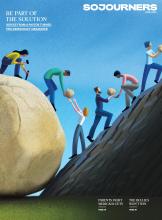SOME U.S. CHRISTIANS fear that the world is in chaos. These Christians have felt their cultural influence waning as our nation becomes more racially, religiously, and culturally diverse. This “chaos” extends to Sunday worship as once-robust congregations dwindle, tithing decreases, young people leave the church, and denominations split under the pressure of politically motivated culture wars. As someone raised in and deeply formed by the evangelical tradition, I have experienced this panic. It is terrifying.
In response, I’ve seen my Christian peers desperately attempt to control our world by donning red MAGA hats and aligning themselves with political strongmen and bullies. They attain positions of power in an authoritarian regime, place guards at the gates of “doctrinal purity,” and advocate for a Christian nationalism that elevates their rights at the expense of the rights of others.
The question we must ask, though, is if Christians should be in control. Is control the task that God has for us? Is gaining control over others the faithful way to worship God and act neighborly in this chaotic world?
But that does not mean that all control is bad. Wielding power and control becomes disordered when they are treated as ultimate goods. In “On Christian Teaching,” fourth century theologian Augustine of Hippo provides a helpful framework for this: “enjoyment” and “use.” To enjoy something is to treat it as the highest good — as an end in itself. To use something, then, is to put that thing in service to what we ultimately enjoy. God has given us some things to be used for the sake of something beyond them, while others exist to be ultimately enjoyed in themselves. The things that we enjoy, Augustine says, are what we ought to love.
Read the Full Article

